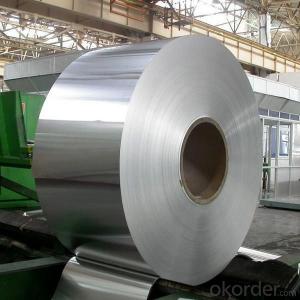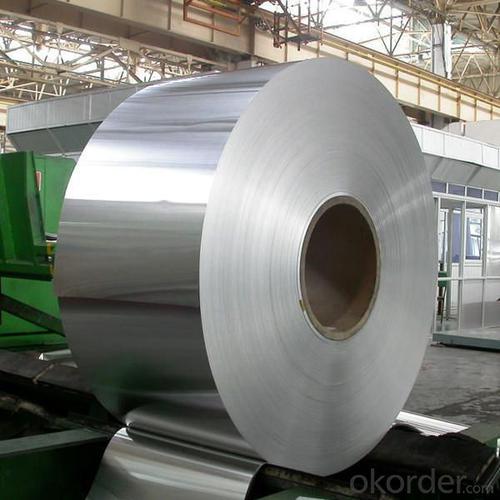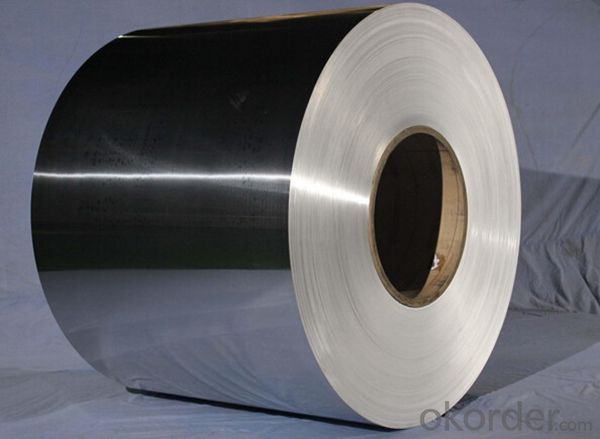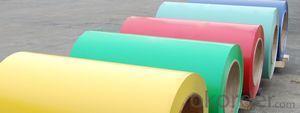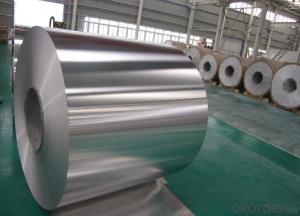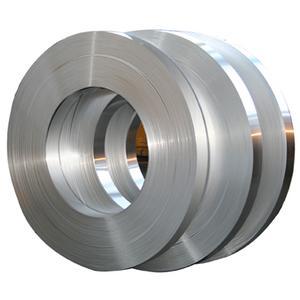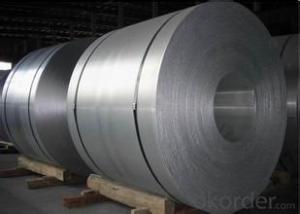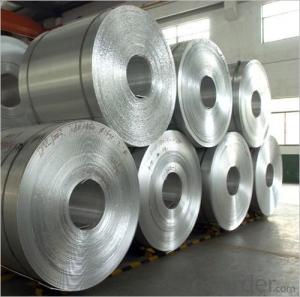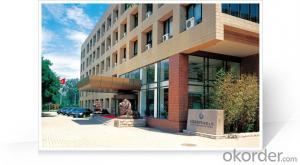1070 DC Aluminium Cast Coil for further passing
- Loading Port:
- Shanghai
- Payment Terms:
- TT OR LC
- Min Order Qty:
- 5 m.t.
- Supply Capability:
- 1000 m.t./month
OKorder Service Pledge
OKorder Financial Service
You Might Also Like
Specification
1. Structure of 1070 DC Aluminium Cast Coil for further passing Description
1070 DC Aluminium Cast Coil for further passing is one semi-finished aluminium material. This coil can be rolled down to aluminium coil,sheet,circle ect. The alloy AA1050 is widly used in building, industry ect. Its weight is much lower than steel. So many customers choosed aluminium material instead of steel.
2. Specification of 1070 DC Aluminium Cast Coil for further passing
Aluminum Coil/Sheet | |
Main Specification | |
Alloy | AA1xxx (AA1050, AA1060, AA1070, AA1100 etc.) |
AA3xxx (AA3003, AA3004, AA3005, AA3105 etc.) | |
AA5xxx, AA6XXX (AA5052,AA5083, AA5754, AA6061, AA6062 etc.) | |
AA8xxx(AA8011, AA8006 etc.) | |
Temper | F |
Thickmess | 0.01mm-100mm |
Width | 30mm-1700mm |
Standard | GB/T 3880-2006/ASTM |
Special specification is available on customer's requirement | |
3. Application of 1070 DC Aluminium Cast Coil for further passing
(1).Interior: wall cladding, ceilings, bathrooms, kitchens and balconies, shutters, doors...
(2).Exterior: wall cladding, facades, roofing, canopies, tunnels,column covers , renovations...
(3).Advertisement: display platforms, signboards, fascia, shop fronts...
4. Feature of 1070 DC Aluminium Cast Coil for further passing
Surfact Quality :
Be free from Oil Stain, Dent, Inclusion, Scratches, Stain, Oxide Dicoloration, Breaks, Corrosion, Roll Marks, Dirt Streaks and other defect which will interfere with use,
Mechenical Property:
Chemical Composite and Mechanical Property
5. Certificate of 1070 DC Aluminium Cast Coil for further passing
SGS and ROHS(if client request, paid by client), MTC(plant provided), Certificate of Origin(FORM A, FORM E, CO), Bureau Veritas and SGS (if client request, paid by client), CIQS certificate
6. Image of 1070 DC Aluminium Cast Coil for further passing
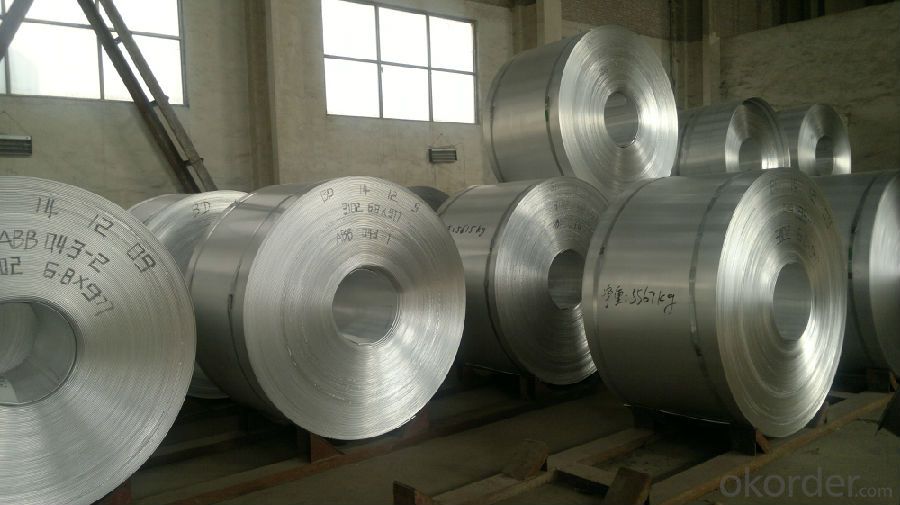
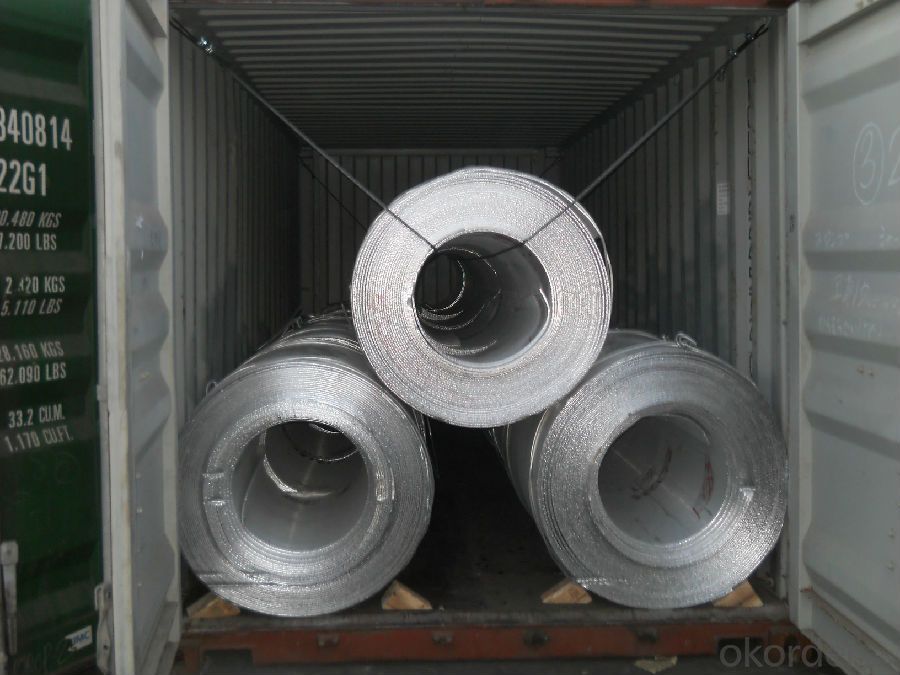
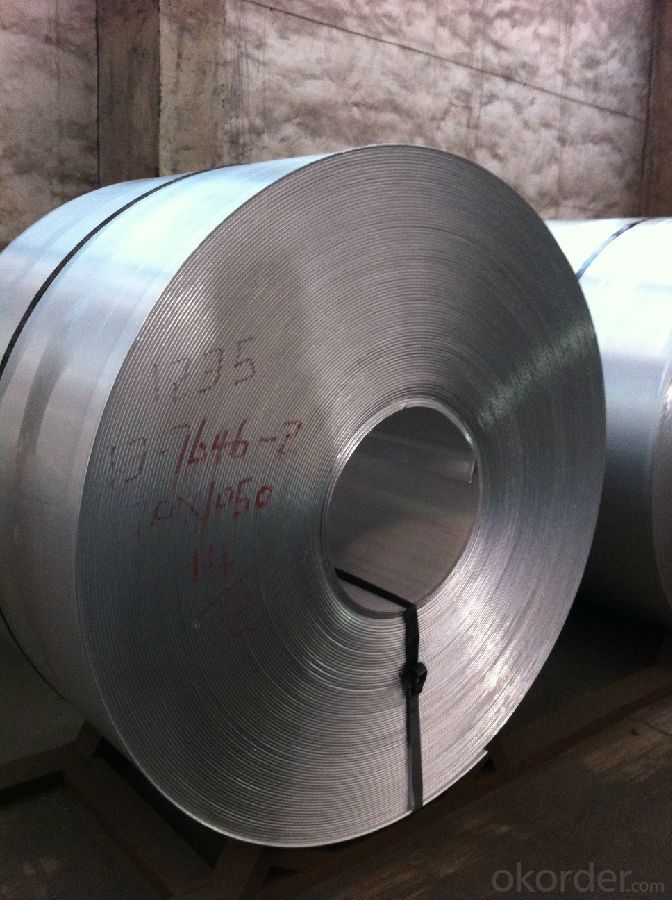
7. Package and shipping of 1070 DC Aluminium Cast Coil for further passing
First, plastic cloth with drying agent inside; Second, Pearl Wool ; Third, wooden cases with dry agent , fumigation wooden pallets, aluminum surface could cover blue PVC film
8. FAQ
1) What is the delivery time?
Depends on actual order, around 20 to 35 days
2) What is the QC system:
We have QC staff of 20 persons and advanced equipment, each production is with MTC traced from Aluminum ingot lot.
3) What market do you mainly sell to?
Australia, America, Asia, Middle East, Western Europe, Africa etc
- Q: Are aluminum sheets suitable for use in food processing or packaging industries?
- Yes, aluminum sheets are suitable for use in food processing or packaging industries. Aluminum is a widely used material in the food industry due to its excellent properties such as being lightweight, corrosion-resistant, and having good thermal conductivity. It is also impermeable to moisture, oxygen, and light, which helps to preserve the quality and freshness of food products. Additionally, aluminum sheets can be easily formed into various shapes and sizes, making them versatile for different packaging requirements.
- Q: How does the surface roughness affect the adhesion of coatings on aluminum sheet?
- The surface roughness of an aluminum sheet directly affects the adhesion of coatings. A rough surface provides more contact points and a larger surface area for the coating to adhere to, resulting in better adhesion. Conversely, a smooth surface offers fewer contact points, making it more difficult for the coating to adhere properly. Therefore, increasing the surface roughness of aluminum sheets can significantly improve the adhesion of coatings.
- Q: Is aluminum sheet fire-resistant?
- Aluminum sheet is not inherently fire-resistant, but it does have certain properties that make it more fire-resistant than other materials. Aluminum has a high melting point, which means it can withstand high temperatures without melting or catching fire. Additionally, aluminum has a low thermal conductivity, meaning it does not easily transfer heat. This makes it more difficult for fire to spread across an aluminum sheet. However, it is important to note that aluminum can still be affected by fire. When exposed to extreme heat, aluminum can weaken and lose its structural integrity. It can also become more susceptible to burning if exposed to certain chemicals or intense flames. To enhance the fire resistance of aluminum sheet, it can be coated with fire-retardant materials or treated with fire-resistant coatings. These additional measures can help to further reduce the risk of fire and improve the overall fire performance of the aluminum sheet. In summary, while aluminum sheet is not completely fire-resistant, it does possess certain characteristics that make it more resistant to fire than other materials. However, it is crucial to take appropriate precautions and use additional fire-resistant treatments when necessary to ensure maximum safety.
- Q: How much is a square inch of a millimeter aluminum plate?
- Make a supplement to the answer on the first floorSo-called:1 lines, when referring to pure aluminum, that is, aluminum content is not less than 99%., weight 2.71 kg / square meterThe 3 Series refers to manganese as the main alloying element, that is, aluminum manganese alloy.
- Q: Are aluminum sheets suitable for structural applications?
- Yes, aluminum sheets are suitable for structural applications. Aluminum is a lightweight and strong material, making it ideal for use in various structural applications. It has a high strength-to-weight ratio, which means that it can provide significant strength while keeping the overall weight of the structure low. This characteristic makes aluminum sheets particularly suitable for applications where weight is a critical factor, such as in aerospace, automotive, and marine industries. Additionally, aluminum sheets offer excellent corrosion resistance, which is important for structures that are exposed to harsh environmental conditions or moisture. They are also highly durable and have good thermal and electrical conductivity. These properties make aluminum sheets suitable for a wide range of structural applications, including building facades, roofing, curtain walls, bridges, shipbuilding, and electrical enclosures. Moreover, aluminum sheets are easy to work with, as they can be easily cut, formed, and welded. This flexibility in fabrication allows for the creation of complex and customized structural components. Aluminum also has a natural oxide layer that provides protection against corrosion, reducing the need for additional coatings or treatments. However, it is important to consider the specific requirements and loads of each structural application before choosing aluminum sheets. While aluminum is strong, it may not be suitable for heavy-load-bearing applications where steel or other materials may be more appropriate. Proper engineering and design considerations should be taken to ensure the structural integrity and safety of the application.
- Q: How do you prevent oxidation of aluminum sheets?
- To prevent oxidation of aluminum sheets, several methods can be employed. One common approach is to apply a protective coating or finish on the surface of the aluminum sheets. This coating acts as a barrier between the aluminum and the external environment, preventing the metal from reacting with oxygen and forming an oxide layer. There are various types of coatings available for this purpose, including anodizing, painting, and powder coating. Anodizing is a process that involves creating a controlled oxide layer on the surface of the aluminum through electrolysis. This oxide layer is highly resistant to corrosion and provides excellent protection against oxidation. Painting and powder coating involve applying a layer of paint or powdered polymer onto the aluminum surface. These coatings form a physical barrier that shields the metal from oxygen and moisture. Another effective way to prevent oxidation is by using aluminum alloys that have enhanced corrosion resistance. These alloys are specifically designed to have a higher resistance to oxidation and can withstand exposure to harsh environments without forming a significant oxide layer. In addition to coatings and alloy selection, proper storage and handling practices are crucial to prevent oxidation. Aluminum sheets should be stored in a clean, dry, and well-ventilated area to minimize exposure to moisture and corrosive elements. Any contact with acidic or alkaline substances should be avoided, as they can accelerate the oxidation process. Regular cleaning and maintenance of aluminum sheets also help in preventing oxidation by removing any contaminants that could promote corrosion. Overall, preventing oxidation of aluminum sheets involves a combination of protective coatings, appropriate alloy selection, and proper storage and handling practices. By implementing these measures, the lifespan and durability of aluminum sheets can be significantly improved.
- Q: Over the years, the thermite reaction has been used for welding railroad rails, in incendiary bombs, and to ignite solid-fuel rocket motors. The reaction is given below.Fe2O3(s) + 2 Al(s) 2 Fe(l) + Al2O3(s)What masses of iron(III) oxide and aluminum must be used to produce 10.0 g iron?a) iron (III) oxideb)aluminiumc)What is the maximum mass of aluminum oxide that could be produced?
- I'm going to show my calculations anyways Fe2O3(s) + 2 Al(s) -- 2 Fe (l) + Al2O3 (s) From the equation : 1 mole of iron (III) oxide 2 moles of aluminium -- 2 moles of iron 1 mole of aluminium oxide Given that iron = 10.0 g = 10.0 g / 55.8 g per mole = 0.179 mol of iron (corr to 3 sig fig) Because the mole ratio of iron to iron (III) oxide is 2 : 1 Therefore moles of iron (III) oxide produced = 0.179 / 2 = 0.0895 mol Convert it back to grams 0.0895 x (55.8 x 2 + 16.0 x 3) = 14.3 grams (corr to 3 sig fig)' a) 14.3 grams of iron (III) oxide must be used ----- Given that iron = ...... (previously calculated) ...... = 0.179 mol of iron (corr to 3 sig fig) Because the mole ratio of iron to aluminium is 1 : 1 Therefore moles of aluminium produced = 0.179 mol Convert it back to grams 0.179 x 27.0 = 4.83 grams (corr to 3 sig fig) b) 4.83 grams of aluminium must be used ----- Given that iron = 0.179 mol Because the mole ratio of iron to aluminium oxide is 2 : 1 Therefore moles of Al2O3 produced = 0.179 / 2 = 0.0895 mol Convert it back to grams 0.0895 x (27.0 x 2 + 16.0 x 3) = 9.13 grams (corr to 3 sig fig) c) 9.13 grams of aluminium oxide is the maximum mass that could be produced P.S. The relative molecular masses used are from my textbook
- Q: I did electrolysis by adding aluminum to the ends of the wire. I waited about 2 hours, and then I filtered the water. After it dried, I was left with powder. It's gray.It that aluminum powder or something else? I'm making thermite, if its not aluminum powder will it still work?
- Kinda sorta, the problem with this is that all you did was made aluminium oxide or hydroxide, when you electrolyzed the aluminium you also electrolyzed a bit of water with it, which added a hydroxyl group to the aluminum, which may have dropped a hydrogen when you dried it. If you could find an aluminium compound that is water soluble (DAMNED HARD to find) you could electrolyze it in water to get aluminium dust in the water, but that isnt very reliable or economical, the best thing for you to do is to get a ball mill or rock tumbler, add aluminium fold and about half full of regular marbles, let it run for 3 or so weeks. You need it really fine!
- Q: This question asks for criteria or factors to consider when selecting a high-quality aluminum sheet.
- <p>To choose a quality aluminum sheet, consider the following factors: 1) Thickness and weight, which should meet your specific project requirements. 2) Surface finish, ensuring it's smooth and free from defects. 3) Purity and alloy type, as different alloys have different properties. 4) Certifications, ensuring the sheet meets industry standards. 5) Supplier reputation and customer reviews for reliability. 6) Price, ensuring it's reasonable for the quality. 7) Conductivity and strength, depending on your application. 8) Corrosion resistance, important for longevity. Always inspect the sheet for any visible defects and ensure it's from a reputable supplier.</p>
Send your message to us
1070 DC Aluminium Cast Coil for further passing
- Loading Port:
- Shanghai
- Payment Terms:
- TT OR LC
- Min Order Qty:
- 5 m.t.
- Supply Capability:
- 1000 m.t./month
OKorder Service Pledge
OKorder Financial Service
Similar products
Hot products
Hot Searches
Related keywords
